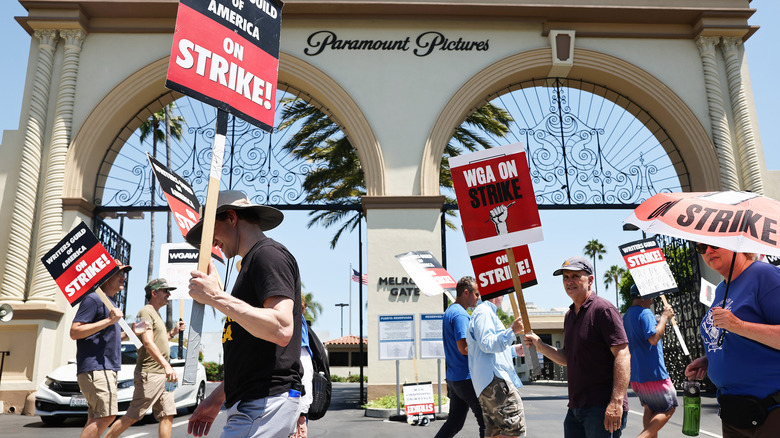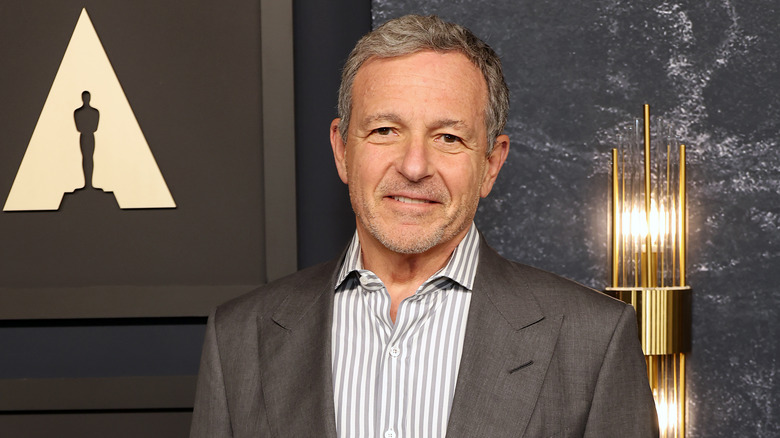Disney CEO Bob Iger Calls SAG-AFTRA Strikers Disruptive & Damaging To The Industry
Disney CEO Bob Iger has some thoughts about the impending Screen Actors Guild strike.
During an appearance on CNBC's "Squawk Box" which was reported by Variety, Iger said, "It's very disturbing to me. We've talked about disruptive forces on this business and all the challenges we're facing, the recovery from COVID which is ongoing, it's not completely back. This is the worst time in the world to add to that disruption."
"I understand any labor organization's desire to work on behalf of its members to get the most compensation and be compensated fairly based on the value that they deliver," the studio head continued, speaking to network anchor David Faber. "We managed, as an industry, to negotiate a very good deal with the directors guild that reflects the value that the directors contribute to this great business. We wanted to do the same thing with the writers, and we'd like to do the same thing with the actors. There's a level of expectation that they have, that is just not realistic. And they are adding to the set of the challenges that this business is already facing that is, quite frankly, very disruptive."
Iger is referencing the fact that, amidst the ongoing strike led by the Writers Guild of America, the Directors Guild of America reached a successful deal with studios. The WGA, however, still has demands for the Alliance of Motion Picture and Television Producers (or the AMPTP) — which the studios haven't adequately addressed.
SAG-AFTRA is set to strike alongside the WGA
After SAG-AFTRA's deal with the AMPTP officially expired at midnight PST on July 13, 2023, the organization is set to take a vote on whether or not they'll strike — but considering how many actors have joined their writers' rooms on the picket line since the WGA began striking in May, it feels likely. The guild released a statement after their deal expired, saying, "In the face of the AMPTP's intransigence and delay tactics, SAG-AFTRA's negotiating committee voted unanimously to recommend to the National Board a strike."
If SAG-AFTRA joins the WGA and embarks on a strike, this will effectively bring the entertainment industry to a screeching halt — immediately after the Emmy nominations were announced, in fact. Press tours would end as soon as the strike begins, and actors would show up to the picket line each day instead of filming lucrative projects for studios like Disney. As for the reason behind the strike, there are a lot of issues at play, but there are a few big ones. Studios haven't guaranteed that they won't manipulate new artificial intelligence technologies to replace writers (an issue that could also affect actors). The advent of "mini-rooms" means that only established showrunners can get their foot in the door, while newer writers never get a chance to book a life-changing job. Finally, with the rise of streaming services, studios not only pay writers less than they made during the era of network television, but they also frequently remove entire projects so they don't have to keep paying the writers who created them.
Bob Iger thinks the strikers need to be realistic
Though Iger capitulated that he wants those striking to "get as much as they possibly can in compensation for their people," he thinks the writers on strike also need to be "be realistic about the business environment, and what this business can deliver."
"It will have a very, very damaging affect on the whole business, and unfortunately, there's huge collateral damage in the industry to people who are supportive services, and I could go on and on," Iger concluded. "It will affect the economy of different regions, even, because of the sheer size of the business. It's a shame, it is really a shame."
Iger is set to step down as the head of Disney after 2026, so perhaps that's why he feels comfortable criticizing the writers and actors who create Disney's content rather than acknowledging that not only are their demands reasonable, but their complaints and grievances regarding AI, unfair pay, and mini-rooms are justified. In that vein, perhaps it would behoove Iger to be more realistic about his own inflated salary.


